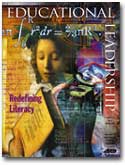What Do the Experts Say?
What Do the Experts Say? Helping Children Learn to Read by Rona F. Flippo. Portsmouth, NH: Heinemann, 1999
Educators caught in the crossfire of the "reading wars" will find What Do the Experts Say? refreshing. Flippo's volume is actually two books in one: a study of areas of agreement among diverse reading researchers and a collection of portraits by master reading teachers.
Flippo first reports on a research project in which she identified common ground among diverse reading experts. From whole language advocates to proponents of traditional skills-based reading curriculums, the experts agreed on a series of statements about instructional approaches that foster—and thwart—early reading. Given the notions that politicians and the media have perpetuated regarding reading instruction, readers may be surprised by some of the agreements. Participants agreed, for example, that emphasizing only phonics instruction would be detrimental to students. But as Flippo warns readers, "This study and book are not about how to teach reading. We have instead been just looking at agreements concerning contexts and practices for reading."
The contexts and practices that facilitate early reading come to life in chapters by master teachers in very different settings. Gay Fawcett, Lilia Del Carmen Monzo, Kim Boothroyd, and Margaret Berry document their struggles to help young people become literate. For Fawcett, the reading "experts" were, first and foremost, her students. She says that in her early years of teaching, "I didn't even know about the 'Great Debate.'. . . All I knew was that I had twenty-eight first graders that needed to learn to read."
Flippo's grand finale synthesizes the reading research with the personal teaching portraits. She then invites readers to share their own teaching and learning experiences in a follow-up study.
Appropriate for teachers, administrators, policymakers, and parents, What Do the Experts Say? brings voices of sense and hope to the vitriolic debate over reading methodology.
Published by Heinemann, 361 Hanover St., Portsmouth, NH 03801. Price: $15.
—Reviewed by Joan Montgomery Halford, Senior Associate Editor of Educational Leadership.
Building Character in Schools
Building Character in Schools by Kevin Ryan and Karen Bohlin. San Francisco: Jossey-Bass, 1999
How is good character formed? Developing good character, Ryan and Bohlin argue, is the responsibility of each individual. However, because character building is an artistic and developmental process, it can go very wrong. Therefore, a prime responsibility of parents and a central mission of schools are to see that each child has appropriate guidance in the process of self-sculpting.
Keenly aware of the arguments of opponents, the authors attempt to calm the irrational fear that character education is glorified brainwashing. Educators cannot escape the responsibility to foster core virtues in students. Because we teach moral values by example, we might as well be deliberate about doing it right. The authors suggest appropriate core virtues, but acknowledge that communities must select what to teach.
The authors focus on visible and hidden curriculums, noting that all school personnel are responsible for character education, not just teachers and administrators.
Readers will look in vain for definitive lists of virtues that schools should teach. The authors intend, rather, to promote a collegial discussion on "practical ways to bring moral instruction to life." They describe character education as "gradual soul-turning," "acquiring integrity," and helping individuals become better human beings. Whether we agree or not, we can benefit from this dialogue about "knowing the good, loving the good, and doing the good."
Published by Jossey-Bass, 350 Sansome St., San Francisco, CA 94104. Price: $25.
—Reviewed by Donald C. Wesley, Principal, Orchard Park High School, Gowanda, New York.
